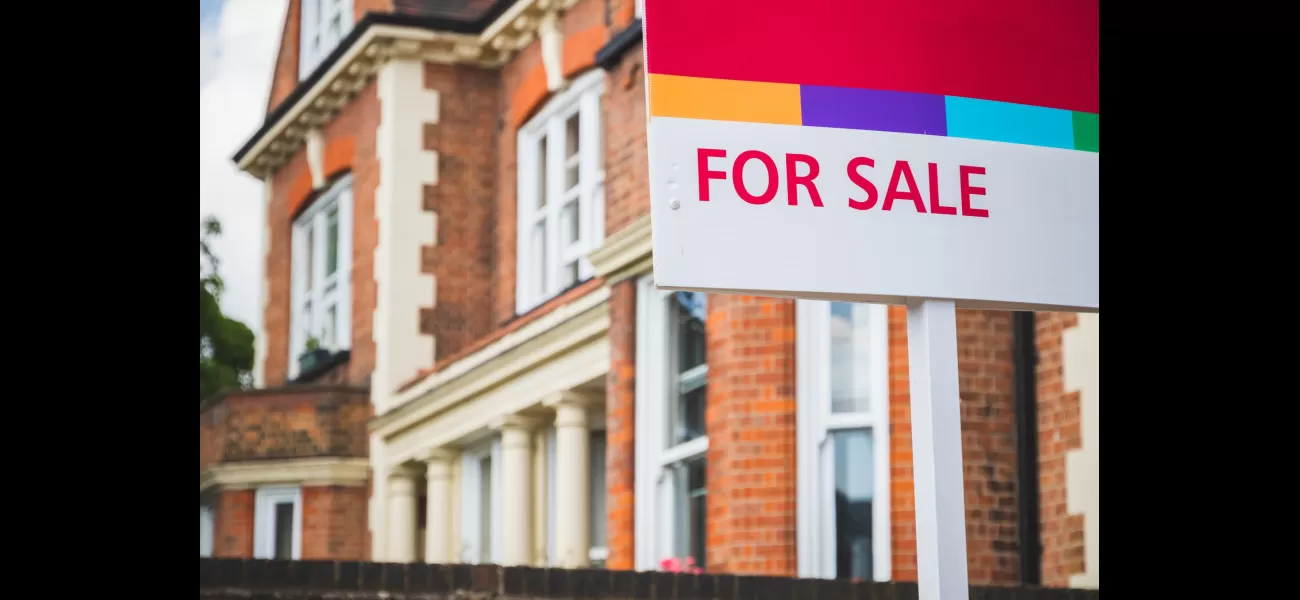Good news for London residents: buying a house just got simpler. Here's the reason.
These recommendations will speed up your progress.
February 2nd 2024.

Saving up to buy a home can often feel like a daunting and never-ending task. But according to recent data, the process may now be a little less grueling. A study conducted by Halifax revealed that in 2023, first-time homebuyers were able to pay an average of £9,057 less upfront compared to the previous year. This translates to a 16% decrease in deposit amounts in some regions of the UK.
However, the amount still varies greatly depending on location, with the North East having an average deposit of £29,740 and London at a staggering £108,848. Despite this, London did see a significant drop of 15%, while traditionally more affordable areas like Scotland and Wales only experienced a decrease of less than 4%. The average cost of a property for first-time buyers also fell by 5%, from £302,008 in 2022 to £288,136.
Although the amount required for a downpayment is still considerable, there is progress being made. This is good news for renters who may feel like saving up is an endless and tiring process. In fact, the average deposit in the country now sits at £53,414, which is around 19% of the average purchase price.
London continues to have the highest deposits, but along with the South East and East Midlands, it has also seen the largest decrease. This means that Londoners may now be able to reach their homeownership goals in a shorter amount of time, making the monthly savings seem less daunting.
Let's take a look at the numbers. The median annual salary for those working in London is £33,845, which translates to a monthly take-home pay of £2,859. The average rent in the city is £750 for a room or £1,100 for a studio flat, and according to Numbeo, a single person's monthly estimated expenses (excluding rent) come to £1,102.30.
Assuming that you stick to a budget and don't take any holidays, a typical renter could save £1,070.67 per month. This means that it would take just under 10 years to save up the required £127,320 for a deposit in 2022. However, with the recent decrease in deposit amounts, it would now only take around eight and a half years. Just imagine what you could do with those extra 18 months.
But while it may not be a life-changing amount, it is still the biggest drop in deposit amounts since 2013 when Halifax started collecting data. Even during the pandemic in 2020, the decrease was only 13%.
Luckily, there are a few ways to potentially boost your savings and reach your homeownership goals sooner than expected. One option is to open a Lifetime ISA, which is a savings account specifically for first-time homebuyers. The government provides a 25% bonus on the money you put in each year, up to a maximum of £4,000. This could potentially shave eight months off your savings timeline, but the money must be in the account for at least 12 months before buying a home.
Another tip is to follow the 50-30-20 rule, which allocates 50% of your income for needs, 30% for wants, and 20% for savings. However, you can adjust these percentages to suit your savings goals. It's important to be realistic with your approach to savings to avoid feeling overwhelmed and giving up. You can also automate your savings by setting reminders and regularly checking in on your progress.
Another way to boost your savings is to consider a side hustle. This could involve utilizing your skills and circumstances to find a niche, such as freelance writing, babysitting, dog walking, or tutoring. Alternatively, you could sell unwanted items or take online surveys for extra income. Just remember to declare any earnings over £1,000 to HMRC through self-assessment.
In addition to finding ways to boost your savings, it's also important to cut costs where possible. This could include downsizing to a shared flat or moving in with family, as well as reassessing your bills and subscriptions for potential savings.
Saving up for a home may still require discipline, time, and the occasional reset, but with consistency and a few money-saving tips, you may be able to reach your homeownership goals sooner than expected. So don't get discouraged and keep working towards that downpayment – your future self will thank you.
However, the amount still varies greatly depending on location, with the North East having an average deposit of £29,740 and London at a staggering £108,848. Despite this, London did see a significant drop of 15%, while traditionally more affordable areas like Scotland and Wales only experienced a decrease of less than 4%. The average cost of a property for first-time buyers also fell by 5%, from £302,008 in 2022 to £288,136.
Although the amount required for a downpayment is still considerable, there is progress being made. This is good news for renters who may feel like saving up is an endless and tiring process. In fact, the average deposit in the country now sits at £53,414, which is around 19% of the average purchase price.
London continues to have the highest deposits, but along with the South East and East Midlands, it has also seen the largest decrease. This means that Londoners may now be able to reach their homeownership goals in a shorter amount of time, making the monthly savings seem less daunting.
Let's take a look at the numbers. The median annual salary for those working in London is £33,845, which translates to a monthly take-home pay of £2,859. The average rent in the city is £750 for a room or £1,100 for a studio flat, and according to Numbeo, a single person's monthly estimated expenses (excluding rent) come to £1,102.30.
Assuming that you stick to a budget and don't take any holidays, a typical renter could save £1,070.67 per month. This means that it would take just under 10 years to save up the required £127,320 for a deposit in 2022. However, with the recent decrease in deposit amounts, it would now only take around eight and a half years. Just imagine what you could do with those extra 18 months.
But while it may not be a life-changing amount, it is still the biggest drop in deposit amounts since 2013 when Halifax started collecting data. Even during the pandemic in 2020, the decrease was only 13%.
Luckily, there are a few ways to potentially boost your savings and reach your homeownership goals sooner than expected. One option is to open a Lifetime ISA, which is a savings account specifically for first-time homebuyers. The government provides a 25% bonus on the money you put in each year, up to a maximum of £4,000. This could potentially shave eight months off your savings timeline, but the money must be in the account for at least 12 months before buying a home.
Another tip is to follow the 50-30-20 rule, which allocates 50% of your income for needs, 30% for wants, and 20% for savings. However, you can adjust these percentages to suit your savings goals. It's important to be realistic with your approach to savings to avoid feeling overwhelmed and giving up. You can also automate your savings by setting reminders and regularly checking in on your progress.
Another way to boost your savings is to consider a side hustle. This could involve utilizing your skills and circumstances to find a niche, such as freelance writing, babysitting, dog walking, or tutoring. Alternatively, you could sell unwanted items or take online surveys for extra income. Just remember to declare any earnings over £1,000 to HMRC through self-assessment.
In addition to finding ways to boost your savings, it's also important to cut costs where possible. This could include downsizing to a shared flat or moving in with family, as well as reassessing your bills and subscriptions for potential savings.
Saving up for a home may still require discipline, time, and the occasional reset, but with consistency and a few money-saving tips, you may be able to reach your homeownership goals sooner than expected. So don't get discouraged and keep working towards that downpayment – your future self will thank you.
[This article has been trending online recently and has been generated with AI. Your feed is customized.]
[Generative AI is experimental.]
0
0
Submit Comment





